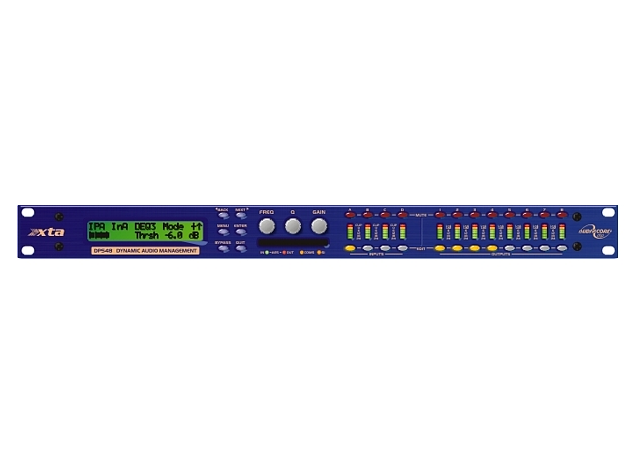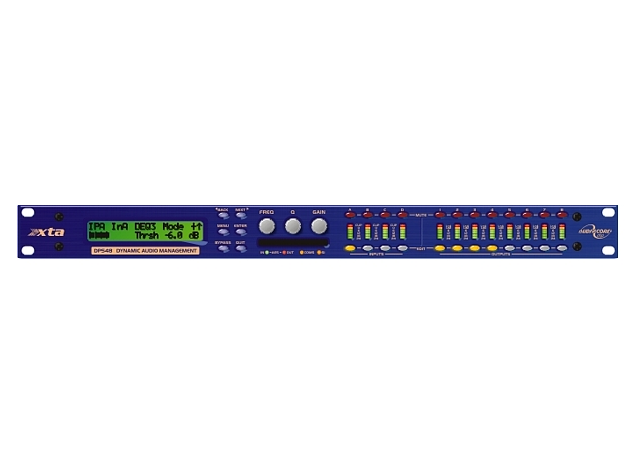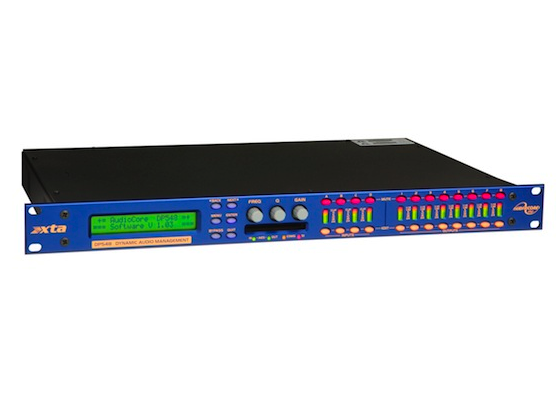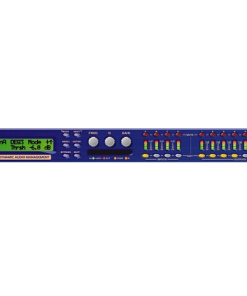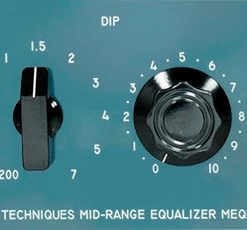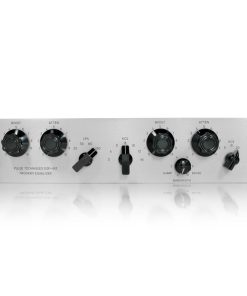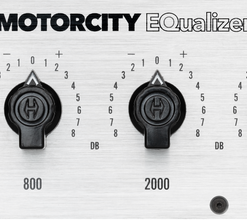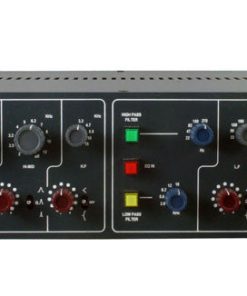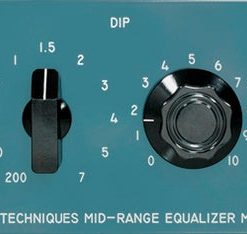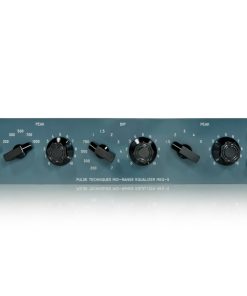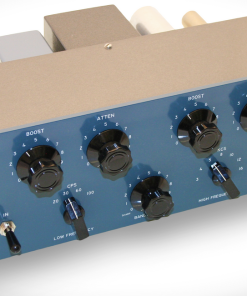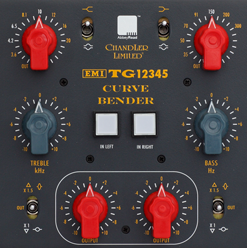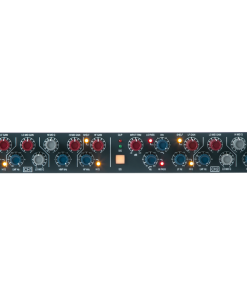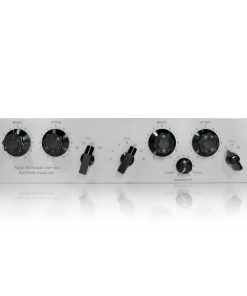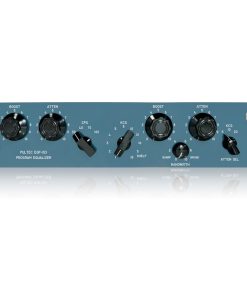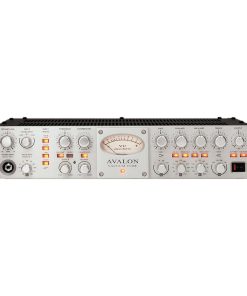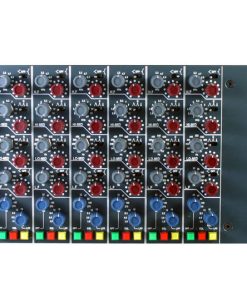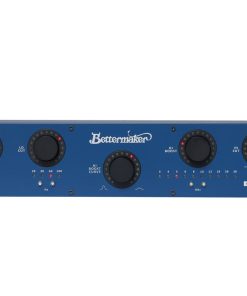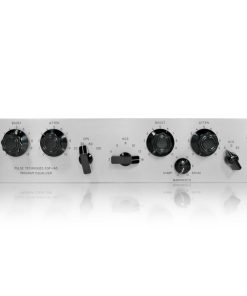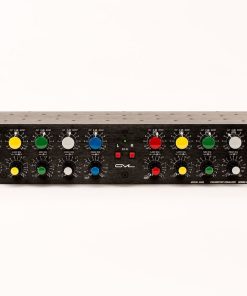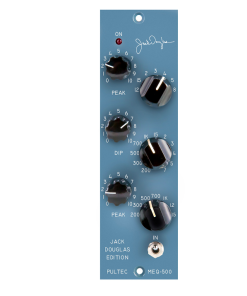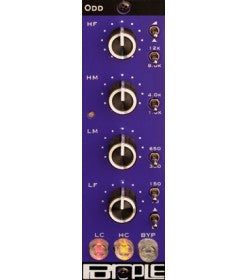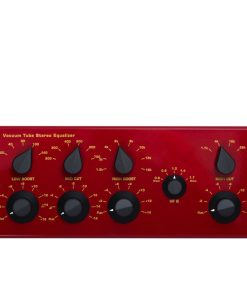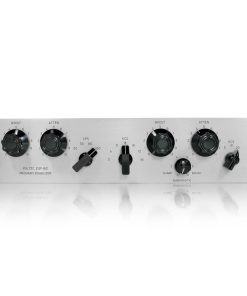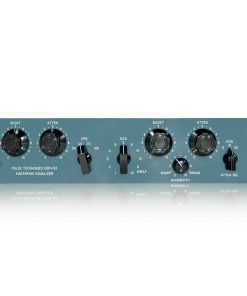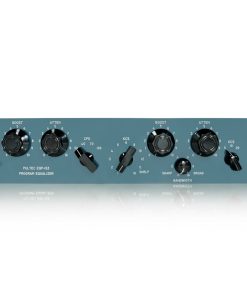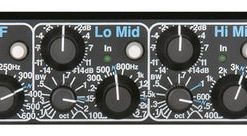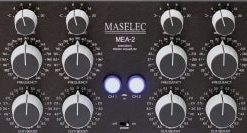XTA DP548 XTA
$ 6.495,00 $ 1.623,75
It’s a long list to cover, but for those who have never used a 4 Series unit, there is a formidable array of tools availble to cater for your creative as well as your control/corrective needs.
Each input has a 28 band graphic EQ that can be configured to model either our own GQ600, or older inductor based designs such as the DN27.
There are an additional 8 bands of “traditional” parametric EQ on each input. All parametric sections can be reconfigured to many alternate filter behaviours, including the familiar high and low shelves and notch filters, but along with bandpass, elliptic and variable ‘Q’ shapes, and phase adjustment, in 2 degree steps.
On top of all this EQ that you might be used to comes the incredibly powerful dynamic EQ. Three bands of SiDD’s dynamic EQ are available on each input, with all four modes of operation supported (so, cut/boost either above or below the threshold). Each band will cover the full 20-20k range and has controls for envelope (attack/release) as well as setting the maximum allowable amount of gain adjustment and choosing the “strength” of the effect (the ratio in dynamics terms).
Dynamic EQ may be stored in its own memories, as can graphic EQ settings, all other input settings or all output settings, and every combination of these if necessary!
Considering how daunting this could be, and it is all still editable via the front panel, AudioCore opens up the dynamic EQ ediitng in an incredibly intuitive manner.
Routing inputs to outputs is as flexible as ever with any input or combination of inputs being switchable to any output, and there are various useful templates to get you started (along with default crossover points to help).
The DP548 also supports a full matrix mixing mode where inputs may be mixed in any ratio to any outputs with four “sends” being available on each output channel instead of just switching on/off.
Looking at output sections, the requisite crossover filters offer slopes from 6dB/Octave up to 48dB/Octave. Nine more bands of parametric EQ follow and then we have a a choice of dynamics useful for protection or for creative use.
Before the limiter sections there is now a fully featured compressor with variable knee to turn it from a safe corrective tool with hard knee to a gentler (but still with a high ratio if required) effect that only makes its presence felt gradually as the threshold is approached and exceeded.
Each output also features a combination of limiters – a limiter designed to protect individual drivers from over-heating, and an additional look-ahead “D-Max” limiter for added safety and to prevent driver over-excursion.
Add to this sub-millimetre accuracy when introducing time alignment with completely flexible ganging of all channels, and it can be seen that the DP548 will fit the bill in any situation.
DP548 Specifications:
Inputs Electronically balanced (transformers optional)
AES/EBU (selectable) fitted as standard to all Series 4 units
Impedance >10k ohms
CMRR >65dB 50Hz – 10kHz
Outputs All electronically balanced (transformers optional)
AES/EBU fitted as standard to all Series 4 units
Source Imp
Minimum Load 600ohm
Maximum Level +20dBm into 600 ohm load
Sampling Rate DP548 – Up to 96kHz internal, up to 192kHz can be accepted and converted.
Frequency Response ±0.5dB 10Hz – 32kHz
Dynamic Range >116dB 20Hz -20kHz. Unwtd
Distortion
Maximum Delay 650 mS. (increment 0.325 µs steps)
Output gain Adjustable +15dB to -40dB in 0.1 dB steps and mute
Equalisation:
Filters Parametrics – 8 Per input / 9 per output
Additional filters 28-band graphic on each input
Each parametric can be switched to Bandpass, Allpass, Notch, VariQ, Shelf and Elliptical response
Phase filtering – 2 degree steps on each input and output
Crossover Filters:
Bessel / Butterworth 6/12/18/24/48dB per octave
and Linkwitz-Riley 12/24/48dB per octave
Dynamic EQ:
3 bands per input
Parametric behaviour – 19.7Hz – 32kHz
‘Q’ 0.4 – 128,
Max gain automatic gain adjustment 18dB
Max ratio (cut above mode) 4:1
Max ratio (all other modes) 2:1
Attack 70uS – 2.0 Seconds
Release 11mS – 3.4 Seconds
Compressor:
One per output
Max ratio 16:1
Variable knee – 12 steps + Off (Hard)
Attack 70uS – 2.0 Seconds
Release 11mS – 3.4 Seconds
Mix matrix mode:
Input sends to each output continuously variable from -40.0dB to _15.0dB in 0.1dB steps plus OFF,
Limiter:
Threshold +22dBu to -10dBu
Attack time 0.3 to 90 milliseconds
Release time 4, 8, 16 or 32 times the attack time
Clip/D-max Limiter:
Look-ahead attack time,
Fast, Medium or Slow release times
Connectors:
Inputs 3 pin female XLR
Outputs 3 pin male XLR
RS485 In/Out XLRs
RS232 9 Pin (Female) D Connector
Power 3 pin IEC
Power 60VAC – 240VAC
Consumption
Weight 3.5kg. Net (5kg. Shipping)
Size 1.75”(1U) x 19” x 12” (44 x 482 x 305mm) excluding connectors
*Due to continuing product improvement, the above specificaions are subject to change.
| Options & Addons | DP548, DP544 – 4 X 4 Output version of DP548., OPT-PC1 – PCMCIA PC card 512k SRAM card used for cloning units and storing settings, DP4-GPI – General Purpose Interface Kit for DP4 and DP5 series |
|---|
Prompt Delivery and Professional Packaging
Our long-standing partnership with UPS FedEx DHL and other global carriers lets us offer a range of shipping services. Our warehouse staff is extremely skilled and will package your items according to our precise and exact specifications. Your goods will undergo an extensive inspection and be safely packaged prior to being sent out. Each day, we ship to thousands of customers in many countries. The fact that we are committed to becoming the biggest online retailer in the World is clear. These warehouses are in Europe in the same way as they are in USA.
Note: Orders that include more than one item are assigned a processing period depending on the item.
Before shipping, we will inspect thoroughly the items you have ordered. Most orders are shipped within 48 hours. Expected delivery time is between 3-7 days.
Returns
Stock is dynamic. It's not entirely managed by us since we are involved with multiple entities, including the factory and the storage. The actual stock can change at any moment. It is possible that your order may be out of stock once the order has been placed.
Our policy lasts for 30 days. We cannot exchange or refund your order if it has been 30 days from the date of purchase.
For your item to be returned it must be in its original packaging, unopened and in the condition you received it. The item must be in its original packaging.
Related products
Equalizers
Equalizers
Equalizers
Equalizers
Equalizers
Equalizers
Equalizers
Equalizers
Equalizers
Equalizers
Equalizers
Equalizers
Equalizers
Equalizers
Equalizers
Equalizers
Equalizers
